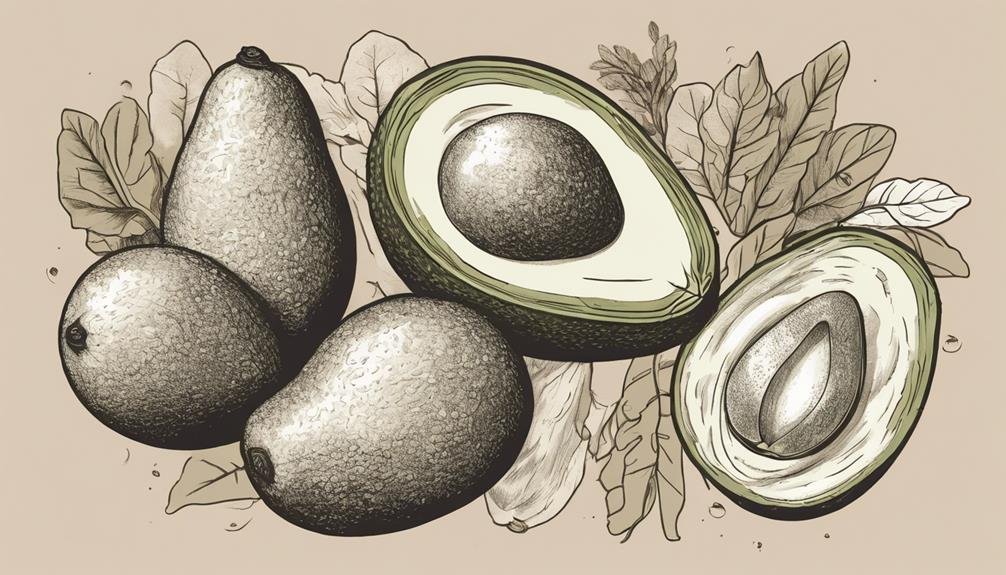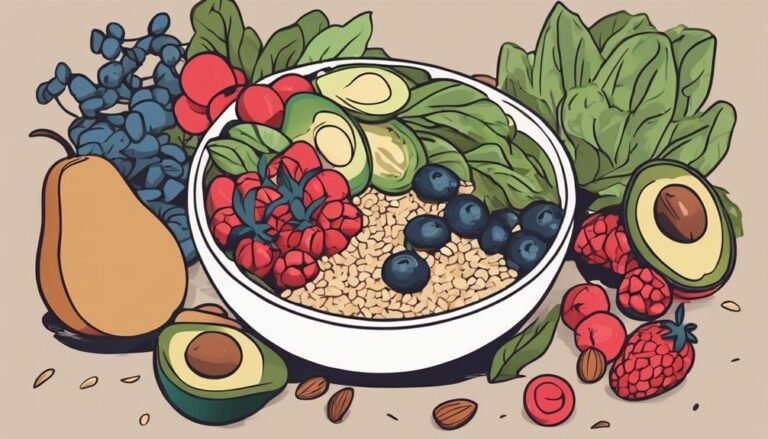Optimal Gut Health for Men 40+: Diet Tips
To optimize gut health after 40, focus on a fiber-rich diet, incorporating whole grains, fruits, and vegetables. Probiotic-rich foods like yogurt and fermented items can enhance beneficial bacteria. Include omega-3 fatty acids through fish to reduce inflammation. Stay hydrated with water and herbal teas, avoiding sugary snacks and processed foods that disrupt gut balance. Regular meals packed with nutrients—like oatmeal for breakfast and salmon for dinner—keep you energized. Prioritize these habits to maintain resilience and overall well-being in this phase of life. You'll discover even more gut health strategies that can make a real difference.
Key Takeaways
- Prioritize fiber-rich foods like whole grains, fruits, and vegetables to enhance digestion and support gut microbiome health.
- Include probiotic-rich foods such as yogurt, kimchi, and kefir to promote beneficial gut bacteria and improve nutrient absorption.
- Incorporate omega-3 fatty acids from fish, flaxseeds, and walnuts to reduce gut inflammation and support overall gut lining health.
- Stay hydrated with water and herbal teas to aid digestion and maintain optimal gut function.
Importance of Gut Health
Understanding the importance of gut health is essential, as it directly impacts your overall well-being and energy.
A healthy gut helps in digesting food efficiently, absorbing nutrients, and supporting your immune system. When your gut isn't functioning well, you might experience fatigue, bloating, or even mood swings.
It's also linked to mental health; a balanced gut can improve your mood and reduce anxiety. By maintaining gut health, you're laying a strong foundation for a healthier life, especially as you age.
Prioritizing gut health can enhance your liveliness and resilience, making daily tasks feel easier. So, pay attention to your gut; it's more than just digestion—it's a key player in your overall health strategy.
Key Nutrients for Gut Health

To keep your gut thriving, it's vital to focus on key nutrients that support its health and function. Incorporating these nutrients into your diet can make a significant difference:
- Fiber: Helps maintain regular bowel movements and feeds beneficial gut bacteria.
- Omega-3 fatty acids: Reduces inflammation and supports the gut lining.
- Magnesium: Aids digestion and helps regulate gut motility.
Probiotic-Rich Foods
Incorporating probiotic-rich foods into your diet can considerably enhance your gut health and overall well-being. These foods are packed with beneficial bacteria that help balance your gut microbiome, improving digestion and boosting your immune system.
Yogurt is a fantastic choice, especially varieties with live cultures. Fermented foods like kimchi, sauerkraut, and kefir also provide a rich source of probiotics. Don't forget about miso and tempeh; they're excellent plant-based options.
If you're not keen on these foods, consider probiotic supplements, but aim for whole foods when possible. Regularly including these items in your meals can lead to better nutrient absorption and a healthier gut environment, making you feel more energetic and vibrant.
Give your gut the care it deserves!
Fiber and Its Benefits

Fiber plays an essential role in maintaining your gut health by promoting regular digestion and feeding beneficial gut bacteria.
Including enough fiber in your diet can lead to numerous health benefits that support your overall well-being. Here's how fiber can help you:
- Improves digestion: Regular fiber intake helps prevent constipation and keeps your digestive system running smoothly.
- Supports weight management: High-fiber foods can keep you feeling fuller for longer, reducing the urge to snack.
- Regulates blood sugar: Fiber slows down sugar absorption, helping to stabilize your blood sugar levels.
Make fiber a priority in your meals for ideal gut health!
Foods to Avoid
Certain foods can wreak havoc on your gut health, so it is crucial to know which ones to limit or avoid altogether. Here's a quick guide on what to steer clear of:
| Foods to Avoid | Why to Avoid Them |
|---|---|
| Processed Foods | High in unhealthy fats and sugars |
| Sugary Snacks | Can disrupt gut bacteria balance |
| Artificial Sweeteners | May lead to digestive issues |
| Red and Processed Meats | Linked to gut inflammation |
| Dairy Products | Can cause bloating and discomfort |
Hydration and Gut Function

Staying hydrated plays a vital role in maintaining a healthy gut, especially after cutting back on foods that can disrupt your digestive system.
When you're well-hydrated, your body can efficiently process food and absorb nutrients, which is essential for gut health.
Here are some hydration tips to keep in mind:
- Drink plenty of water throughout the day.
- Include herbal teas or infused water for variety.
- Eat water-rich foods like fruits and vegetables.
Meal Planning Strategies

Planning your meals can markedly enhance your gut health by ensuring you include nutrient-dense foods that support digestion. Start by creating a weekly meal plan that balances fiber, protein, and healthy fats. This approach helps you avoid last-minute, unhealthy choices.
Here's a simple meal planning table to guide you:
| Meal | Foods to Include | Gut Health Benefits |
|---|---|---|
| Breakfast | Oatmeal, berries, nuts | High in fiber, antioxidants |
| Lunch | Quinoa, spinach, chicken | Supports protein intake |
| Dinner | Salmon, broccoli, brown rice | Omega-3s for inflammation |
| Snacks | Greek yogurt, fruits | Probiotics and vitamins |
Questions
How Does Stress Impact Gut Health in Men Over 40?
Stress negatively affects your gut health by altering gut bacteria and increasing inflammation. You might experience digestive issues, discomfort, and changes in appetite. Managing stress is essential for maintaining a healthy gut and overall well-being.
Can Gut Health Affect Mental Health and Mood?
Yes, gut health can greatly affect your mental health and mood. When your gut's balanced, it produces neurotransmitters like serotonin, which helps regulate emotions. A healthy gut often leads to a more positive mindset.
What Are the Signs of an Unhealthy Gut?
When your gut's out of whack, you might feel like you're walking on eggshells. Signs of an unhealthy gut include bloating, gas, fatigue, cravings, and frequent digestive issues. Don't ignore these red flags!
How Often Should I Take Probiotics for Best Results?
You should take probiotics daily for the best results, ideally at the same time each day. Consistency helps your gut adapt, ensuring you reap the maximum benefits from the probiotics you're consuming.
Are There Supplements That Support Gut Health for Men 40+?
Did you know that about 70% of your immune system resides in your gut? You can support your gut health with supplements like probiotics, prebiotics, and digestive enzymes, enhancing your overall well-being as you age.
Conclusion
Optimizing your gut health is like tuning a musical instrument; when everything's in harmony, you feel and function better.
By focusing on the right nutrients, incorporating probiotic-rich foods, and embracing fiber, you can nurture your gut and enhance your overall well-being.
Avoiding certain foods and staying hydrated is just as essential.
With thoughtful meal planning, you'll create a balanced diet that supports your gut, helping you thrive as you navigate life in your 40s and beyond.







